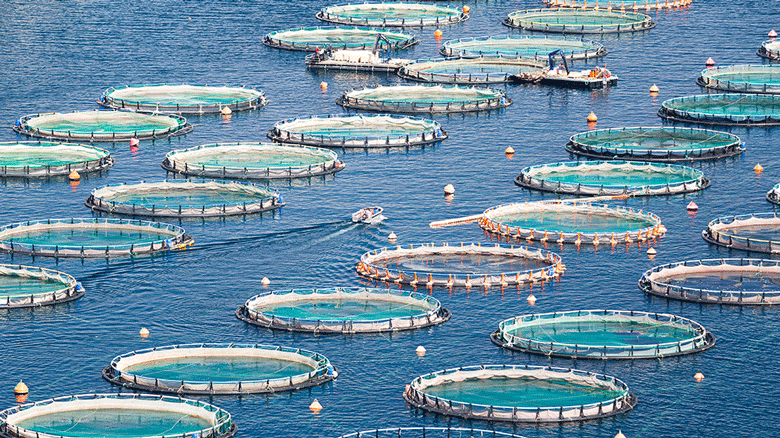Eric Jors, the CEO of American Aquafarms, the company that proposed a large sea-based fish farm in Frenchman Bay, recently said he saw continued opportunity to provide sustainable aquaculture in Maine that met global food demands while mitigating climate change and benefiting the local community and economy.
Let’s explore those claims, since they affect Maine’s entire coast.
American Aquafarms’ DEP wastewater discharge applications specified a discharge of about 4,700 pounds a day of nitrogen (think fertilizer). That’s more daily nitrogen production than Maine’s four largest cities combined.
That untreated waste would go into a small bay that’s already experiencing increasing harmful algal blooms which close fisheries, and that’s exhibiting widespread declines in nitrogen-sensitive eelgrass populations which nurture essential, larval-stage organisms. Adding more nitrogen will accelerate these changes.
Two independent oceanographic studies indicate that waste from American Aquafarms’ pens would not flush but concentrate to make, one study says, most of the bay exceed the DEP’s nitrogen concentration limits in just months.
The firm plans to use new technology called “closed pens” intended to isolate the salmon from sea lice parasites.
Producers say fish inside closed pens will be healthier; therefore, stocking densities can be higher and pens can be six times larger than conventional open-net pens. They fail to mention that outside the pens, the environment would be degraded by much higher nutrient concentrations.
As to the claims of healthier fish, consider inhumane stocking densities, and recall that the only test to evaluate closed pens with harvest-size salmon ended precipitously due to poor water quality and fish mortality.
Nutrient, bacterial, viral, pharmaceutical, and pesticide pollution that degrades habitats has long given net pens a bad reputation. However, closed pen technology, and its requirements for staggering fuel consumption, adds gigantic carbon impact to the concerns.
Fish in closed pens require vast quantities of water pumping to deliver oxygen and to remove waste. American Aquafarms’ DEP applications specified pumping and discharge of 4.1 billion gallons per day of effluent containing dissolved nitrogen, urine, uncollected feces, and uneaten food. While the nutrient impact is widely recognized, petroleum pollution and the carbon footprint of closed pens are less understood. American Aquafarms’ applications say this pumping would require 80,000 gallons of diesel fuel every seven to ten days.
Transporting, storing, and burning this diesel at floating pens next to Acadia National Park has many downsides. Obviously, pollution, and spill risks, but significantly, CO2 from the project’s ten 500-kilowatt full-time generators would produce about 4% of the CO2 emitted in Maine for electric power generation.
Emissions from these generators and from trucking fish, feed, diesel, oxygen, and solid waste long distances would make it impossible for Maine to meet its climate goals. American Aquafarms claims that’s better than flying salmon from Norway, reminding us that the world needs to feed itself, so all’s OK. That argument misses and hides the point.
Namely, that none of this is necessary.
Why? Because there are proven alternatives for profitable, cost-effective, sustainable salmon production (e.g.: Sustainable Blue, AquaMaof). These true-recirculating technologies allow facilities to be built far from the ocean.
They draw groundwater once. Water is pumped and recycled using renewable power. Nitrogen is removed. Solid waste is composted, then methane digested. No polluted discharges into oceans or aquifers.
They’re located close to consumer demand, dramatically decreasing transportation carbon footprint.
The availability of proven, sustainable, alternatives is why even Norway, the world’s largest salmon producer, just enacted a 35% tax on ocean-raised salmon. It’s why the state of Washington partnered with Sustainable Blue after banning net pens.
Both governments recognized that continued extraction and pollution of finite ocean resources is untenable. They’re incentivizing an industry move to sustainable, land-based, true-recirculating production. That’s what responsible, climate-friendly, aquaculture policy looks like—not ocean pens.
The only time producers want to farm salmon in the ocean is when lax regulations allow them to freely discharge pollutants and waste. Then, communities pay later with failed ecosystems. Maine should learn lessons from far more experienced players: ban all ocean finfish aquaculture.
If Maine wants to develop its economy around finfish aquaculture, it should be thinking about selling technology, not fish. We should leverage our aquaculture-savvy academic infrastructure and proven technologies to develop and export food production systems to a world that wants locally produced, sustainable food.
Henry Sharpe serves as president of Frenchman Bay United, a coalition of groups and individuals opposing the American Aquafarms proposal for a fish farm in Frenchman Bay.





